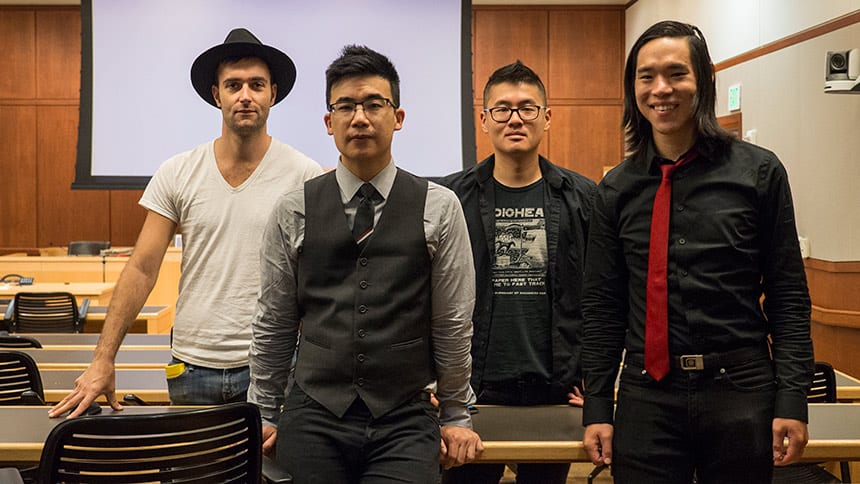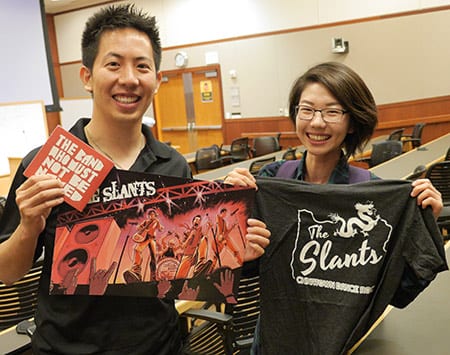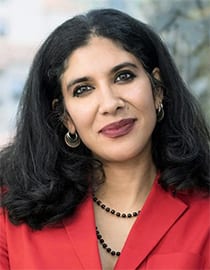
By Rachel DeLetto
It’s not often that the spirit of rock and roll fills the chambers of the United States Supreme Court. But last term, Matal v. Tam brought an Asian-American dance rock band before the justices to decide whether its name, The Slants, could be denied a trademark on the basis that it was a disparaging term. The band, founded by Simon Tam, recently brought their unique perspective on free speech—along with their instruments—to Berkeley Law.
At an event organized by the student chapter of the American Constitution Society (ACS), the band—Tam (bass), Ken Shima (vocals), Randy Bemrose (drums), and Joe X. Jiang (guitar)—performed a rousing 3-song acoustic set in the Moot Court room, including a cover of Bruce Springsteen’s “Born in the USA.” But the audience of approximately 30 law students seemed more excited about the main event: Tam’s presentation on the intersection between race, intellectual property, and freedom of speech.
“Over the past year, UC Berkeley has been at the forefront of the national debate over freedom of speech on college campuses,” said event organizer Brady Williams ’19, vice-president of Berkeley Law’s ACS chapter. “As law students, we are especially attuned to this debate, and especially keen to its consequences.”
Williams said the opportunity to bring The Slants to campus to discuss the case provided an ideal framework for an open discussion about these complex and challenging topics.
Reclaiming offensive stereotypes
Tam’s ascent to serving as a named party on a Supreme Court case began with his upbringing as an American-born son of Chinese and Taiwanese immigrants in San Diego. To help him assimilate and succeed in an American school, Tam’s parents followed the advice of teachers and never spoke their first languages—Mandarin, Cantonese, and Taiwanese—at home.
But the price of assimilation was the loss of some of his Asian culture, Tam said. Then something happened that allowed him to reclaim his identity.
One afternoon, while Tam was in seventh grade, it was his turn to help clean up after recess. Suddenly he was pushed to the ground. “I looked up and saw four people staring down at me and grinning,” Tam recalled. They started punching and kicking him and throwing sand in his face. “They kept calling me a ‘Jap’ and a ‘Gook.’ Finally I just snapped. I said, ‘Hey! I’m a Chink! If you’re gonna be racist, at least do it properly!’” Confused and shocked, the kids stopped attacking and walked away.
“That’s the first time I realized there’s power in saying ‘this belongs to me, and you can’t use it against me,’” said Tam.
Years later, Tam was living in Portland and playing in a punk rock band. He decided to start an all-Asian band that would provide a bold portrayal of his culture.
The name, The Slants, came about because it was a stereotype people kept bringing up as common to all Asians. Once again, Tam recognized a chance to turn a phrase often used as racial slur on its head.

The band began to take off, playing anime conventions across the country and participating in events discussing Asians in America, anti-bullying, and turning stereotypes upside down; as well as activism and public policy relating to the Asian American community and advocating for culturally competent laws.
Earning their mark
It was around 2009 when the subject of applying for a trademark for the band’s name first arose. Tam’s lawyer assured him it would be an inexpensive and simple process.
But the application was rejected. The United States Patent and Trademark Office (USPTO) refused to register “The Slants” because it was “disparaging to persons of Asian descent.”
Tam was shocked. The band had just finished an 18-month tour and advocacy circuit during which time they had never encountered anyone who had been offended by their name. But under Section 2a of the Lanham Act, registrations can be refused if the mark or trade name can be considered “scandalous, immoral, or disparaging.” In this case, based on evidence gathered from UrbanDictionary.com, the application was rejected.
So began a seven-year process: three applications, rejections, and subsequent appeals to the USPTO; significant legwork and financial investment by Tam in finding experts to conduct surveys and lawyers who could represent them in the process; an appeal to the Federal Circuit (which came down en banc in Tam’s favor); and finally an appeal from the USPTO to the Supreme Court on the issue of whether the rejection of a trademark on the basis of disparagement violates the First Amendment.
Intellectual property vs free speech
In an 8-0 decision (Justice Neil Gorsuch was not present for oral argument and therefore abstained), the justices concluded that the government’s rejection of the trademark was an attempt to prevent “speech expressing ideas that offend,” which “strikes at the heart of the First Amendment.”
In his majority opinion (Justice Anthony Kennedy filed a concurring opinion joined by Justices Ginsburg, Sotomayor and Kagan), Justice Samuel Alito reaffirmed that the government may never censor speech because the content may be offensive to some. “Speech that demeans on the basis of race, ethnicity, gender, religion, age, disability, or any other similar ground is hateful; but the proudest boast of our free speech jurisprudence is that we protect the freedom to express the thought that we hate.”
Berkeley Law Dean Erwin Chemerinsky, a renowned constitutional law scholar, said that despite the heated current debate over whether the First Amendment protects offensive speech on campus and in the media, he was unsurprised at the unanimous decision.
“The most basic principle of the First Amendment is that the government cannot regulate speech based on the viewpoint expressed,” said Dean Chemerinsky. In this case, the USPTO was doing just that. “If the band had chosen a name favorable to Asians it would have been allowed, but because it was seen as derogatory, it was not allowed. That is viewpoint discrimination.”

The dean pointed out that the case is a rare instance in which a government regulation of intellectual property was found to violate the First Amendment.
Professor Sonia Katyal, co-director of the Berkeley Center for Law & Technology, said the opinion could have a dramatic effect on the intersection of trademarks and social justice, and the trajectory of commercial speech generally.
“It will be interesting to see how courts, especially lower courts, will interpret Matal in light of the freedom it extends to others to trademark racially disparaging terms,” Katyal said.
Despite the significant effects of the decision in affirming and expanding the protection of speech under the First Amendment, she does not read the case as a blanket victory for vulnerable groups at the trademark office. Specifically, because of the holding in this case, “the Washington Redskins are now able to keep their trademark, much to the chagrin of many Native Americans who justifiably believed that the team should be forced to change its name.”
Impact on students
The experience has given The Slants a unique combination of art, advocacy, and legal history that makes law students the perfect audience for their music and message.
“It was shocking to hear the process that The Slants had to go through to trademark their name, especially the time and costs it took to bring the case to fruition,” remarked Deborah Choi ’20. She emphasized that the government should not have discretion to say what is or is not disfavored or offensive speech, “particularly because of the subjective nature of racial epithets.”
As a Korean-American woman, Choi was impressed by the band’s commitment to using their art as a form of advocacy to empower the Asian-American community. “After attending this event, I feel inspired by the fact that there are many advocates out there, in many different shapes and forms, that are pursuing social justice for all kinds of marginalized communities,” she said.
Concord Cheung, also a first-year student of Asian descent, said that although he doubts that the case will extinguish the stereotype completely, the band’s dedication to effecting change “is measurable progress towards a better society and country.” Chatting with Tam and the rest of the band about their unlikely ordeal, Cheung said he was impressed that “these were just regular Asian guys that did what they thought was right.”
Tam agreed that the arduous process was about far more than a trademark. “When the government is given the power to censor how members of a group are able to define themselves, it is the marginalized—the communities of color, LGBTQ, and low-income folks—who lose out. That right should belong to the community itself.”
“This is why we press forward,” Tam concluded. “This is why The Slants, indeed, was a name worth fighting for.”